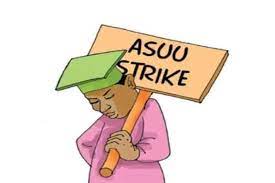ASUU Strike: Implications for the future of Nigerian youths
 ASUU Strike: Implications for the future of Nigerian youths
ASUU Strike: Implications for the future of Nigerian youths
The university is the brain centre of a country, and education is the magic bullet that frees one from slavery. However, Nigeria’s tertiary institutions, in particular, have experienced frequent closures due to industrial actions in recent years. It is easier to conceive than to articulate how these frequent school and academic program closures affect pupils’ learning ability. As a result of both academic (ASUU) and non-academic staff strike activities, tertiary education in Nigeria has experienced severe setbacks. This has consistently put students in pitiful situations, disrupting academic programs, extending their study years unjustifiably, causing students to pay less attention to their academic work, and negatively affecting relationships between lecturers and students, among other things.
Universities are considered the fortress of learning, the source of intellectual growth, and a place where tomorrow’s leaders are created. It is important to remember that a university serves one primary purpose: it provides information and value. In other words, a university advances when it can offer information and value; conversely, when it is improperly managed by administrators and personnel, it cannot fulfil its role of offering knowledge and value.
Why is a country’s university system essential to its functioning?
It is impossible to undervalue the contribution that universities provide to the growth of human capital, research, and technological innovation. Investment in higher education is a crucial part of national development efforts worldwide. Today’s nations rely more and more on the knowledge, concepts, and abilities generated by university-based research. Nations invest in higher education because society anticipates it to have three main effects on national development. First, society expects its university to produce highly skilled workers in technology, engineering, management, and other professions. Second, universities have a duty to produce their own corps of academic workers, or the intellectual resource pool, which will use scientific research to produce new knowledge and innovation to address developmental issues. Thirdly, universities generate managers, administrators, and teachers for higher-level institutions that deal with human resources development.
What is ASUU?
The Academic Staff Union of Universities is the primary union whose persistent industrial action has a negative impact on student’s academic performance (ASUU). The organization, which now represents academic employees at the Universities of Ibadan, Nigeria, Nsukka, Ahmadu Bello, Ife, and Lagos, was established in 1978 as the successor to the Nigerian Association of University Teachers (NAUT), which had been established in 1965. The union actively fought against the military administration in the 1980s. For fair pay and university autonomy, the union planned a national strike in 1988. The ASUU was consequently outlawed on August 7, 1988, and all of its assets were seized. After a second strike, it was permitted to continue in 1990, but on August 23, 1992, it was once more outlawed. On September 3, 1992, a deal was reached that addressed several of the union’s objectives, including the right of employees to engage in collective bargaining. In 1994 and 1996, the ASUU conducted additional industrial strikes to protest the military government of Sani Abacha’s firing of employees. The union persisted in being aggressive in its demands for the rights of university workers in the face of resistance from President Olusegun Obasanjo’s administration after democracy was restored in Nigeria in 1999 with the establishment of the Fourth Republic. The national president of ASUU requested in July 2002 that Justice Mustapha Akanbi of the Independent Corrupt Practices Commission look into allegations of financial mismanagement and corruption at the University of Ilorin.
ASUU strikes in Nigerian history
For fair pay and a system of academic autonomy, the Academic Staff Union of Universities conducted a national strike in 1988. The Babangida Administration thereupon outlawed the Union on August 7, 1988, and took possession of all of its assets. After a strike, it was only permitted to recommence in 1990 before being outlawed once more on August 23, 1992.
On September 3, 1992, a deal was finally achieved that addressed several of the Union’s requests, including the right of employees to engage in collective bargaining.
The Union persisted in being adamant in its demands for its members’ rights in universities after establishing Nigeria’s Fourth Republic in 1999. Since that time until now (2022), ASUU has been forced to go on strike frequently (in fact, at least 16 times), which has disrupted the students’ desperately needed academic programs. The outcome is clear: most of our students in postsecondary institutions are mentally retarded and end up with half-baked ideas.
Thus, the problem of the Academic Staff of Universities Union’s ongoing strikes has come to represent a source of shame for the entire country. With the same strike action lasting nearly three months in 2022, the Union is already extracting a significant amount of blood from the academic session of the year 2021/22. Isn’t Nigeria creating a parody of its own future?
 ASUU Strike: Implications for the future of Nigerian youths
ASUU Strike: Implications for the future of Nigerian youths
Read Also: Ooni of Ife’s latest marriage: facts and public opinions
Implications of ASUU strike on the future of youths
Due to the frequent strikes, the majority of students turn to go to town in search of opportunities to earn stipends. Some of them eventually land jobs with large organizations. a predicament that lessens the appeal of education and places students in a precarious position when classes restart following strike action. Along with the rising school dropout rate, many Nigerians have lost faith in the country’s educational system. Nowadays, parents who can afford it send their kids abroad for school, and those who can’t pay the tuition enrol their kids in privately run universities in the nation. According to a The Guardian article from August 2021 titled “ASUU, FG squabble over the unfulfilled accord,” Nigeria loses N1.5 trillion per year to foreign education. Previously inferior to Nigeria in terms of educational standards, neighbouring West African nations like Ghana, Uganda, and the Benin Republic now seem like better options for Nigerians looking for a good education on the African continent.
A nationwide survey conducted by the News Agency of Nigeria (NAN) has revealed that Nigerians are generally sick of the ongoing strikes, while many young people are feeling frustrated and losing interest in education as the one-month deadline approaches and anxious students and their parents await the next action. The strikes are causing young people to lose trust in the school and, as a result, turn to harmful vices that could jeopardize their futures. This development harms our country and does not reflect well on one that genuinely wants to further its transformation and growth. The largest black nation in the world, Nigeria has a sizable young population. If there is such a large population of teenagers who are not working and are idle due to the ongoing strikes, it is a ticking time bomb, and we are already starting to see the effects of an increase in crime and insecurity.
Constant strikes negatively affect the academic calendar, promote brain drain, and drastically lower the calibre of graduates in the nation. These effects have a considerable impact on national growth. In the best interests of our students, their parents, the educational community, and the nation, the Federal Government should immediately take all necessary steps to begin a real dialogue with ASUU to end the strike and implement negotiated agreements. We must quit tampering with our children’s future.
Hope you enjoy this article?
Share your thoughts in the comment session.
Contact us today for your business consultancy and business advisory services. We can help you fine-tune your idea, structure your business, market your business, train your staff, consult on your retirement plan, coach you for financial success. We also write a business plan and help with fundraising strategies and Grant applications. We can help you start, grow, and expand your business.
We help institutions and organizations write concepts, implement Business plans, and train on business Plan writing in Nigeria.
We can help you write a detailed, bankable and comprehensive business plan for your business idea.
Call any of our business plan consultants on 08105636015, 08076359735, and 08113205312.
Or send a WhatsApp message or email us either at dayohub@gmail.com or info@dayoadetiloye.com.
Related